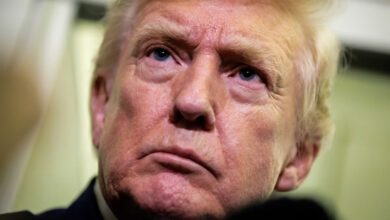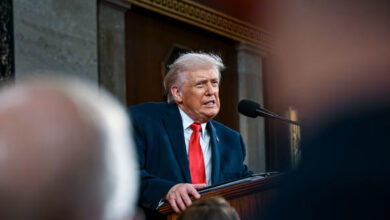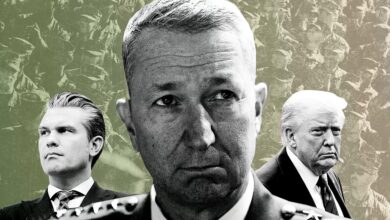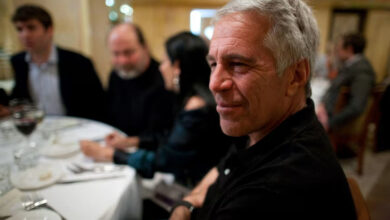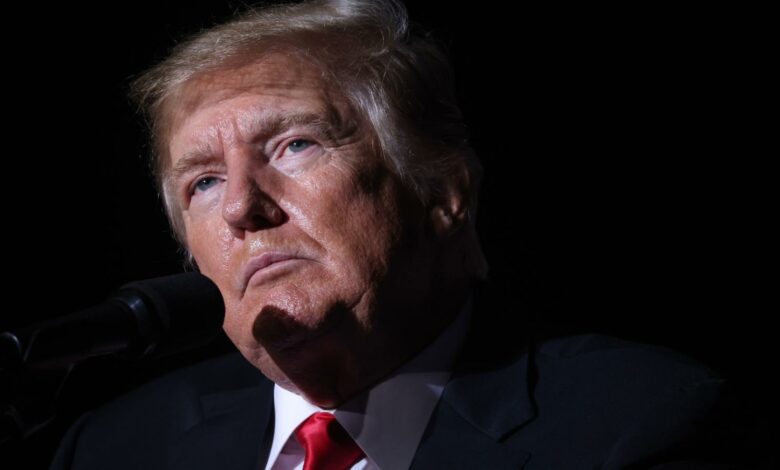
(CNN) – The Trump campaign directed a group of Georgia Republicans to meet in secret and obscure their objectives in an email obtained by federal prosecutors as part of their recent investigation into Donald Trump’s efforts to overturn the election in several swing states.
The email is part of the intensifying Justice Department investigation focused on the Trump campaign’s interactions with so-called alternate Republican electors in states Trump lost and whether a scheme to organize them could be charged as a crime.
The Georgia email has not been disclosed publicly until now. It was sent by Robert Sinners, Trump’s election day operations lead in Georgia on December 13, 2020, 18 hours before the group of alternate electors gathered at the Georgia State Capitol, according to multiple sources familiar with it.
“I must ask for your complete discretion in this process,” Sinners wrote. “Your duties are imperative to ensure the end result — a win in Georgia for President Trump — but will be hampered unless we have complete secrecy and discretion.”
The Fulton County, Georgia, district attorney’s office, which has seated its own grand jury to investigate Trump’s attempts to overturn the election results in Georgia, and the US House select committee on January 6 have also obtained copies of the email, according to sources familiar with it.
The email underscores the Trump campaign’s role in creating false election documents as a way to supplant Joe Biden’s win in Georgia. CNN previously reported that Trump campaign officials oversaw efforts to put forward illegitimate electors in seven swing states Trump lost.
In the email, Sinners also told Trump’s electors to misdirect security guards when they arrived at the statehouse, and to tell the guards they were attending a meeting with two state senators, Brandon Beach and Burt Jones.
“Please, at no point should you mention anything to do with Presidential Electors or speak to media,” Sinners wrote.
The Washington Post also reported on the email Monday.
One source familiar with the campaign said the secrecy was needed because of restricted access at the statehouse during the coronavirus pandemic and post-election political tumult. The need to meet at the statehouse was paramount to make the fake electors’ slate potentially viable under the law, if Biden’s win were to be blocked, the source said.
The Trump campaign and the Georgia GOP didn’t respond to requests for comment this week.
Elie Honig, a CNN senior legal analyst and former federal prosecutor, noted the email could become part of a conspiracy investigation because it could show the scheme went beyond idle chatter, and instead involved the campaign giving electors specific direction. He also noted the significance of asking electors to conceal their actions.
“A prosecutor would argue to a jury, ‘Why the secrecy? What were they hiding?'” Honig said.
Federal probe growing in seriousness
In recent weeks, the federal criminal investigation into electors in Georgia and at least one other state has grown in seriousness.
A federal grand jury subpoenaed documents and the FBI interviewed witnesses about the Trump electors and the campaigns last month, seeking details about the signing and mailing of official election documents and the planning that brought together the slates. Subpoenas have asked witnesses for communications with Trump’s electors, as well as with top Trump campaign officials.
The subpoenas represent a flurry of investigative activity in recent weeks by the Justice Department to move the sprawling investigation, the largest in Justice Department history, beyond the rioters who sacked the Capitol on January 6, and to scrutinize the role of people who worked in political organizing around Trump.
The escalating probe comes as Justice Department officials eye the calendar, with the midterm elections less than six months away. Top Justice officials are mindful that later this summer overt investigative activity, such as issuing subpoenas, may be put on hold, people briefed on the internal discussions say. Department guidelines traditionally call for prosecutors to generally avoid interfering with an imminent election.
Meeting wasn’t ultimately secret
It is unclear if the individuals who received Sinners’ directions even read the message or followed its calls for secrecy, one person familiar with it told CNN.
The email was sent a few hours after Trump campaign and GOP state operatives discussed how some state legislatures would be difficult for GOP electors to access. In Wisconsin — another state where Trump put forward fake electors after his loss — the electors also met in secret, CNN previously reported. One Trump elector in Wisconsin said the secrecy was for security reasons, though the Wisconsin Republican Party disputed that those electors met secretly.
Sinners told CNN this week that in late 2020 he was working at the direction of Trump campaign attorneys and the Georgia GOP chairman David Shafer, who was an elector. “I was advised by attorneys that this was necessary in order to preserve the pending legal challenge’s longevity,” Sinners said.
“Following the former President’s refusal to accept the results of the election and allow a peaceful transition of power, my views on this matter have changed significantly from where they were on December 13,” Sinners added. He now works in the office of Georgia Secretary of State Brad Raffensperger, who resisted pressure from Trump after the election.
Shafer’s attorney told CNN that his client did not try to keep things secret.
“None of these communications, nor his testimony, suggest that Mr. Shafer requested or wished for confidentiality surrounding the provisional electors,” attorney Robert Driscoll said. “Quite to the contrary, Chairman Shafer invited TV news cameras into the proceedings and both issued a statement and gave a televised news interview immediately afterward.”
Beach and Jones, whom the electors were to say they were meeting, also didn’t respond to requests for comment. Neither state official was set to be an alternate elector, but Jones stepped in as one when one of the Trump electors on the day of the meeting dropped out, according to documentation of the Trump electors released by the federal government.
The electors’ meeting ultimately didn’t occur under such a shroud of secrecy. At least one local news outlet captured video of the electors voting for Trump. Georgia Republican Party Chairman David Shafer was also interviewed on camera at the time explaining that the group wanted to provide an alternate slate in case Trump was successful in any of his court challenges.
He was not.
CNN’s Sara Murray and Marshall Cohen contributed to this report.

